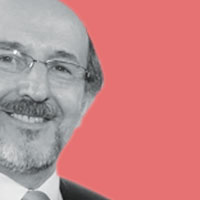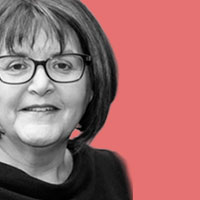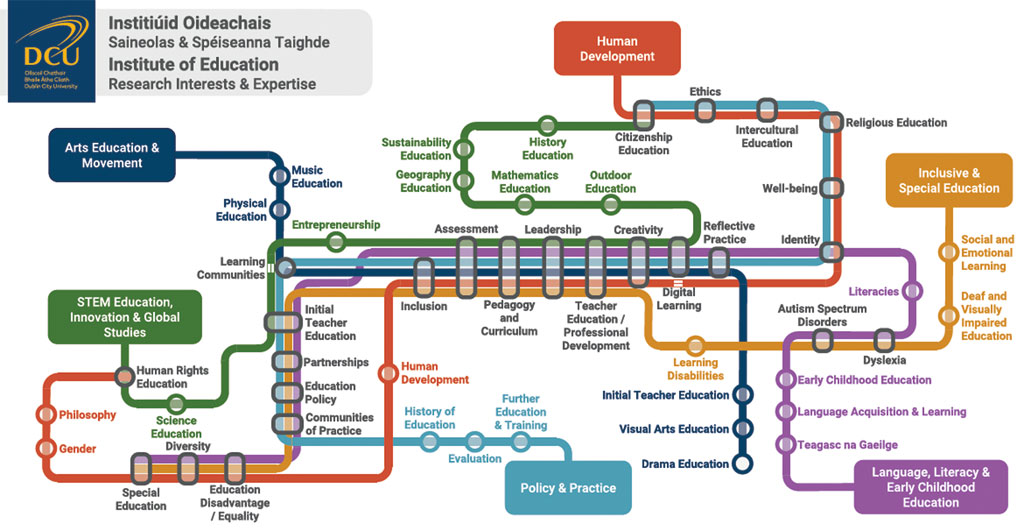


DCU is unique in Ireland in having a full faculty of education. This article outlines the history and structure of the university’s Institute of Education and shows how it will be centrally engaged in transforming the Irish education system and contribute significantly to knowledge creation and policy development across international education systems.
Early in 2012, the Higher Education Authority established an International Review Panel to advise on the structure of Initial Teacher Education (ITE) provision in Ireland. The members of the Panel were: Professor Pasi Sahlberg, then director general of CIMO (in the Ministry of Education) in Helsinki, Finland, who chaired the panel; Professor Pamela Munn, professor emeritus at the University of Edinburgh; and Professor John Furlong, former director of the Oxford University Department of Education. The purpose of the review was to consider the structure of ITE provision in Ireland and to identify possible new structures based on reconfiguring existing programmes to strengthen the quality of teacher education. The International Review Panel published its report in July 2012, and its conclusions were as follows:
The Review Panel recommends that teacher education should be facilitated in a university setting with systematic links to clinical practice in field schools which provide where possible for the full range of sectoral teacher education, spanning early childhood to adult education. This would facilitate greater synergies between the different levels of education. It would also provide a critical mass for improving capacity for high-quality research, the integration of students and staff across a number of disciplines, and the promotion of balanced international mobility of students and staff.
Dublin City University was particularly well placed to respond to this recommendation. As well as its own School of Education Studies, it had established links with St Patrick’s College in Drumcondra and with the Mater Dei Institute. Four years after what has come to be known as the Sahlberg Report, the DCU Institute of Education (IoE) was established through the incorporation of St Patrick’s College, Mater Dei Institute of Education, Church of Ireland College of Education, and the DCU School of Education Studies.
These constituent institutions have a long and distinguished history in teacher education. The Church of Ireland College of Education has been educating primary teachers since 1811, when it was known as the Kildare Place Training Institution. Following several transitions, it became the Church of Ireland College of Education in 1884. St Patrick’s College has been educating primary teachers since 1875 and was Ireland’s largest primary college of education. Mater Dei Institute of Education was established in 1966 to educate teachers of religion for post-primary schools.
In 2019 the DCU Institute of Education has grown to a staff of more than 140 full-time academics and a cohort of more than 4,000 students working and studying across all sectors of the education system. DCU is unique in having a full faculty of education. It is the only higher-education institution to feature education in this way at the heart of its structure and mission. As an institution committed to transforming lives and societies, it recognises the role that education plays in this transformation at every level, and in particular the pivotal role of high-quality teachers and educators in sustaining that vital role of education.
The vision of the DCU Institute of Education is that by 2022 it will be recognised as a global leader in the field of education, as an innovative provider of teacher education, and as a centre of excellence in educational research. It will be centrally engaged in transforming the Irish education system and will be a significant contributor to knowledge creation and policy development across international education systems, through leadership of and participation in a range of research and policy networks.
It is committed to:
Sharing our values, our graduates are:
The DCU Institute of Education created six schools that bring staff together from cognate areas in a coherent structure that is cross-sectoral and spans the continuum of education provision. The schools are as follows:
DCU is committed to university-based initial teacher education built around the three components of academic study, professional practice, and research. We recognise the expectations of government, families, and communities for teachers to do more and be more every day. As central prescription in curriculum planning gives way to increasing school autonomy, we are committed to enabling our students at undergraduate and postgraduate levels to gain the adaptive expertise and sophisticated technical acumen necessary to lead the change process in schools and other educational settings.
[ctt template=”2″ link=”h92Zp” via=”no” ]DCU is unique in having a full faculty of education and in being the only higher-education institution to feature education in this way at the heart of its structure and mission.[/ctt]
The Institute also has two denominational centres: the Mater Dei Centre for Catholic Education and the Church of Ireland Centre. Their work includes supporting the preparation of teachers to work in schools under Catholic patronage and under the patronage of the Church of Ireland and Reformed Christian communities, as well as research and scholarship relevant to denominational and faith-based education.
Three years on, how has the Institute of Education fared so far? Applications for all programmes have increased, and this year the new post-primary teacher education programme for teachers of Gaeilge and Modern Languages attracted forty-five students. A programme like this brings together expertise from across the university – in applied languages, in Gaeilge, and in education – to work together on developing the next generation of language specialists for second-level. We have extended our highly regarded Master’s in Guidance and Counselling, and now offer it in the north-west of the country in response to the acute challenges of recruiting guidance counsellors for schools in that region. With the particular support of the Education and Training Boards in the north-west, this new outreach is fully subscribed, and more are planned.
Plans are under way for a new master’s in early childhood education, building on our highly regarded undergraduate programme in early childhood education, and in 2020 we will admit another cohort of students to our Doctorate in Education programme. With a number of students already signed up in anticipation, we expect places to be in demand, as they were in 2018 when the programme was last offered.
In addition to a large complement of research active staff, the IoE includes 20 postdoctoral researchers and 135 doctoral students researching in the disciplinary area of education and related areas. There are four large-scale research centres: the Evaluation, Quality and Inspection (EQI) Research Centre, the National Anti-Bullying Research and Resource (ABC) Centre, the Centre for Research on Learning and Teaching Irish (SEALBHÚ), and the Centre for Assessment Research in Education (CARPE).
There are a further eleven research groups researching in areas such as early childhood, work-based learning, educational disadvantage, STEM education, digital learning, religious education, citizenship and human rights education, and education for sustainable development. In 2019/2020, DCU’s Higher Education Research Centre and the Institute of Education’s Further Education and Training Centre will be aligned in a new research centre focused on the tertiary sector in its broadest sense.
Recently, the Australian Research Council announced a new global centre for the study of childhood in the digital age. The Centre for the Digital Child will be based at Queensland University of Technology, and the DCU IoE will be contributing to the work of that new AUD35-million centre.
[ctt template=”2″ link=”H95LG” via=”no” ]DCU recognises the pivotal role of high-quality teachers and educators.[/ctt]
In 2016–2019, Institute of Education authors have published 163 peer-viewed journal articles, 97 book chapters, 11 books, and 49 doctoral theses.
Furthermore, the DCU Institute of Education has received €6.7 million in funding in fifty-eight funding awards from national and international competitive funding schemes, as well as corporate and philanthropic funding sources.
2018/2019 was the year of the three presidents. The Institute was the proud home of the president of the International Literacy Association, the president of the Educational Studies Association of Ireland, and the president of the European Research Association. Step up, Dr Bernadette Dwyer, Dr Enda Donlon, and Prof. Joe O’Hara! Although Bernadette is now the immediate past president, the three presidents will be restored in October when the executive dean of the Institute (the present co-author) takes up her role as president of the International Professional Development Association.
 Dr Bernadette Dwyer, Dr Enda Donlon, and Prof. Joe O’Hara
Dr Bernadette Dwyer, Dr Enda Donlon, and Prof. Joe O’Hara
The following graphic illustrates the diversity of the Institute’s research expertise. As with metro maps, the research areas intersect at many points across schools. The Institute is currently working on Research Metro 2.0 to reflect the new tertiary centre and work in the denominational centres.
 The diversity of the Institute’s research expertise.
The diversity of the Institute’s research expertise.
The incorporating institutions had a long history of engagement in Irish education, and in teacher education in particular. Some had international partnerships, and recognition. But it is already evident that the Institute is having an impact at scale and of significance. Examples include working with the European Commission on projects in Lithuania and Croatia on system improvement and change; supporting Educate Together in Ireland in evaluating and developing school ethos in their primary and second-level schools; providing expert support to the OECD in system reviews; informing policy on assessment across the school system; active engagement in the development of the early years workforce in Ireland; and supporting the G20 deliberations on early years and sustainable development.
The Institute played a key role in recognising teachers and the teaching profession through the DCU Teachers Inspire Initiative, culminating in the gala evening of celebration in the Helix in October 2019 – the first of a series of such celebrations which will coincide next year with the hosting of Féilte, the Teaching Council’s festival of teaching.
These are early days, but they are good ones. The buzz on the St Patrick’s Campus of DCU is palpable, as thousands of student teachers and early childhood education students, current teachers and practitioners pursuing professional development and postgraduate studies, an endless stream of curious international delegations, and a fascinating line-up of guest lecturers and speakers cross the threshold every day. The library is always jammed and buzzing (in the places where buzzing is allowed!), and there are great expectations for the new Jesuit Library on the All Hallows campus that will offer more space as well as world-class collections in philosophy and theology.
Recent staff appointments reflect the range and scale of what we are trying to achieve. New colleagues include an early career educator from Taiwan with expertise in augmented reality in education, a second-level principal who led her school through junior cycle reform and then did a PhD about it, and a teacher with thirty years’ experience in every kind of primary school you can imagine. Each in their turn was attracted by the vision and potential of the DCU Institute of Education. Three years old. Building on a great legacy. Inspired by a great vision.
Copyright © Education Matters ® | Website Design by Artvaark Design